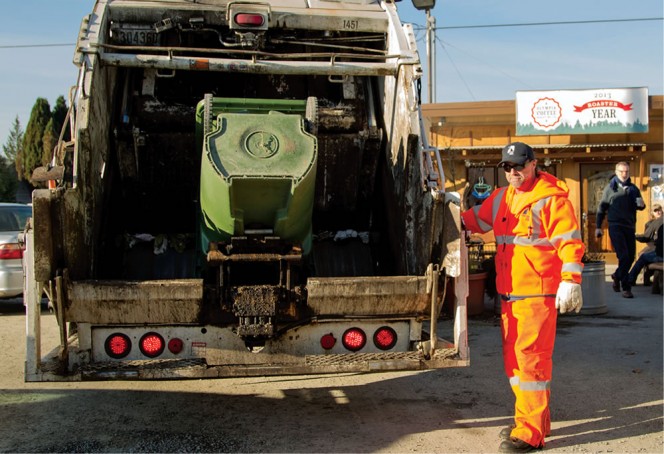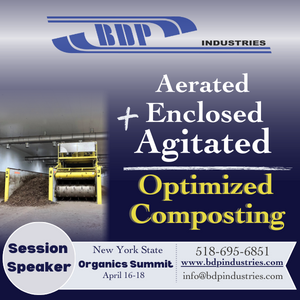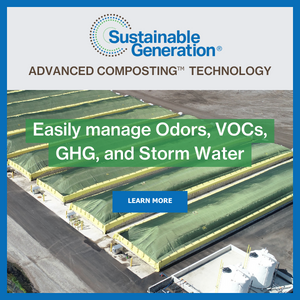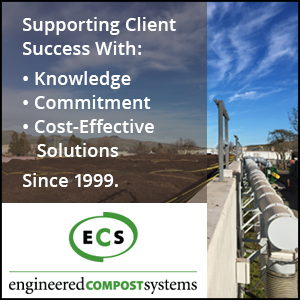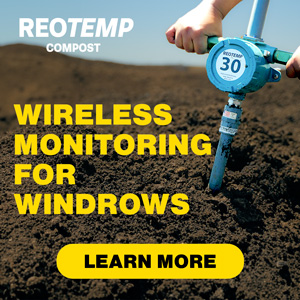BioCycle December 2015
Olympia, Washington: City Moves To Twice Weekly Commercial Organics Collection
The City of Olympia’s commercial composting program has added a second day of collection to its growing service. The additional day was brought about by an increase in customers and tons collected. “We now collect from over 140 commercial customers and hauled nearly 600 tons of organics for composting last year,” notes Spencer Orman, Senior Program Specialist for the City of Olympia who works with businesses on organics collection. “Moving to twice a week collection is a big step up for us. Our once a week collection has grown so much it was pushing our collectors into overtime to finish their routes. The need was there.” The city accepts all food scraps, soiled paper, waxed corrugated, pizza boxes, green waste and clean wood. Compostable bioplastic products are accepted as well (the city has a list of what products are allowed on its website).
Twice a week collection creates opportunities for businesses and for better service, adds Orman: “It’s a great option for businesses concerned about odor and pest issues to get serviced more frequently. For businesses with limited space for containers, such as in downtown or with crowded garbage enclosures, the use of smaller or fewer containers collected more frequently is a great help. It can be the difference between having and not having an organics program.” For the city, it reduces the need for overtime and makes it possible to focus on certain areas of the City on a certain day.
The commercial organics are brought to the Thurston County Waste and Recovery Center in Lacey (the city next to Olympia), where the county oversees that the materials are ground and mixed. “At that point, they can be sent to one of three composting facilities: Silver Springs Organics near us in Rochester, Royal City Organics in on the other side of the mountains in Royal, Washington, and Lenz Composting north of Seattle in Stanwood, Washington,” he explains. “Silver Springs only wants yard waste with some food waste in it. From what I know they mainly get the residential loads that we also collect. Both Royal and Lenz take most of our commercial loads that include all food, yard waste, some food soiled papers and our accepted list of compostable products. This has been in place since 2014. As of earlier this year nothing is going to Royal City Organics on the other side of the mountains due to the apple maggot quarantine issue. So our commercial material is going to Lenz.”
Chambersburg, Pennsylvania: Company Sends Food Scraps To College Farm
Volvo Construction Equipment in Shippensburg, Pennsylvania teamed up with Wilson College in Chambersburg to send its preconsumer cafeteria food waste to the college, where it will be composted for use on the campus’ seven-acre organic Fulton Farm. The farm’s produce is offered to the community through its Community Supported Agriculture (CSA) program, the local farmers market, and Wilson’s dining services. For 10 years, pre and postconsumer food scraps have been collected from Wilson College dining halls and composted in windrows at Fulton Farm. In early 2012, Volvo strived to partner with Wilson’s organic farm to help reduce the amount of organics it sends to the landfill. In order to begin accepting food scraps from an outside business, Wilson College obtained a general permit for on-farm composting from the Pennsylvania Department of Environmental Protection. This permit required a regrading of Wilson’s one-acre composting site to address water runoff concerns associated with accepting more material. Volvo funded the excavation for the shale pad with the help of Advantage Landscaping.
In mid-October, Wilson College began accepting Volvo’s food waste. Consistent with the permit, Fulton Farm can produce up to 13 tons/year of finished compost. According to Chris Mayer, director of the college’s Fulton Center for Sustainable Living, 2.8 tons of food waste are generated annually at the college. Volvo’s one corporate cafeteria feeds 800 employees and generates about 7 tons/year of preconsumer food scraps. If this project proves effective, Mary Reid, environmental consultant for Volvo, hopes that Wilson’s permit will be amended to increase the amount of material that Fulton Farm can accept. This will enable Volvo to send both their pre and postconsumer scraps to Wilson for composting.
The beneficial Volvo/Wilson partnership coincides with Volvo’s mission to become a zero-landfill facility by 2020, as stated by Jean Charles Lambotte, Volvo’s Director of Core Values, and allows Wilson to produce more compost to use on its farm. Additionally, Volvo provides a semiannual $1,000 grant to a Wilson student compost coordinator, who is responsible for monitoring compost quality, turning the windrows, and hauling food waste from Volvo’s kitchens. Mayer refers to this partnership as the “tip of the iceberg”: “In addition to the widespread press, this partnership has allowed us to develop our project for the community and beyond.” Depending on the success of this collaborative partnership, Wilson College may partner with other outside entities to collect more organics.
Washington, DC: Compost And FDA Final Produce Safety Rule
After numerous iterations, the Food and Drug Administration’s (FDA) Food Safety Modernization Act (FSMA) Produce Safety rule is final. It establishes, for the first time, science-based minimum standards for the safe growing, harvesting, packing, and holding of fruits and vegetables grown for human consumption. Biological soil amendments are included in the rule, which FDA defines as “a material, including manure, that is intentionally added to the soil to improve its chemical or physical condition for growing plants or to improve its capacity to hold water.” The rule regarding stabilized compost is as follows: “Microbial standards that set limits on detectable amounts of bacteria (including Listeria monocytogenes, Salmonella spp., fecal coliforms, and E. coli 0157:H7) have been established for processes used to treat biological soil amendments, including manure. The rule includes two examples of scientifically valid composting methods that meet those standards. Stabilized compost prepared using either of these methods must be applied in a manner that minimizes the potential for contact with produce during and after application.”
With regard to use of raw manure, the FDA is conducting a risk assessment and extensive research on the number of days needed between the applications of raw manure as a soil amendment and harvesting to minimize the risk of contamination. At this time, the FDA notes that it “does not object to farmers complying with the USDA’s National Organic Program standards, which call for a 120-day interval between the application of raw manure for crops in contact with the soil and 90 days for crops not in contact with the soil.” The agency “considers adherence to these standards a prudent step toward minimizing the likelihood of contamination while its risk assessment and research is ongoing. … The final rule requires that untreated biological soil amendments of animal origin, such as raw manure, must be applied in a manner that does not contact covered produce during application and minimizes the potential for contact with covered produce after application.”
Alameda County, California: Enforcing Mandatory Recycling Ordinance
The Alameda County Waste Management Authority (the Authority) has begun issuing fines to businesses and multifamily property owners still in violation of Alameda County’s Mandatory Recycling Ordinance. To date, over 100 citation notices have been served, and more are expected as routine inspections continue. Of the locations inspected this year, the majority was found to be in compliance with the Ordinance at the time of inspection, according to the Authority. The law, which went into effect in 2012, requires businesses and multifamily property owners to establish adequate recycling collection service. Additionally, businesses are required to separate recyclable and/or organic materials into the correct containers. Although the county’s cities and unincorporated areas participate in the Ordinance to varying degrees and with different implementation schedules, most have at least basic recycling requirements in place.
The Authority has undertaken extensive outreach to businesses and property owners to assist them in coming into compliance with the law. The few businesses and properties that are still in violation of the Ordinance’s requirements have received multiple communications from the Authority, including an official notification and a notice to correct violation letter. Still not having taken corrective measures, these noncompliant locations are now facing fines. “The Mandatory Recycling Ordinance has been in place for almost three years, and the primary goal of the Authority has been education,” explains Brian Mathews, Enforcement Officer for the Authority. “We are only now issuing the first citations.” Fine amounts can vary from $100 for a single violation to $400 depending on the number and type of violation(s). Continued noncompliance can result in additional penalties. There is a 30-day appeal period.
The Authority considers citations a last resort to achieve compliance. “We are here to serve as a resource for businesses and multifamily property owners that have questions about the Mandatory Recycling Ordinance or are in need of assistance,” says Gary Wolff, the Authority’s Executive Director. “Our agency has provided technical assistance to thousands of local enterprises to start or increase recycling and organics collection services.” The purpose of the Ordinance is to reduce the amount of waste Alameda County sends to landfill and to help it reach long-term waste reduction goals — specifically, to ensure that by 2020, waste sent to landfills contains less than 10 percent of materials that are easily recyclable or compostable. For businesses, the amount of this “good stuff” in the garbage varies by industry. In 2014, 25 to 59 percent of the items in businesses’ garbage containers could have been recycled or composted, according to the Authority. Looking at multifamily properties, an average of 46 percent of their “garbage” is actually recyclable or compostable.
New York, New York: Compost Box Project
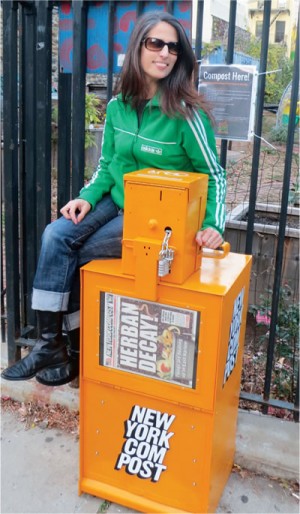
New York City’s (NYC) decommissioned newspaper boxes are being reimagined as receptacles for organic waste collection.
New York City’s (NYC) decommissioned newspaper boxes are being reimagined as receptacles for organic waste collection. Graphic designer Debbie Ullman started the New York Compost Box Project in Spring 2013 as part of her NYC Compost Project’s Master Composter Certification course. These repurposed boxes are currently accepting food scraps at the Urban Garden Center in East Harlem, Earth Matter on Governor’s Island, and at the East Side High School Community Garden in the East Village. “The boxes are meant to start dialogues and make people think more about composting,” explains Ullman. “I wanted to get people to think outside the box while depositing inside it.”
Each box contains two sealed 5-gallon buckets to collect food scraps to be composted on-site at each location. The most frequently used box is at the Urban Garden Center, which composts community organics in tumblers. Earth Matter, a compost education center, composts scraps in a 3-bin system, tumblers, worm bins, and aerated static piles. At the East Side Community Garden, Laura Rosenshine of Reclaimed Organics closely manages a bokashi system. This is the only box that is locked, so those who want to deposit their organic scraps must request a passcode via email. With this passcode comes a detailed how-to guide, encouraging depositors to sprinkle bran on the scraps.
These boxes are a good 24/7 addition to the DSNY’s ongoing organics pilot project for New Yorkers. As for outreach, this urban intervention uses creativity and the element of surprise to its advantage. “We are so conditioned to see things a certain way that we see things that way regardless of subtle changes,” notes Ullman. “When people finally ‘get it’, they don’t forget it, and they ask questions which is exactly what was intended.”
She hopes to expand the project to more locations around NYC. Despite the ample empty newspaper boxes still on street corners, Ullman’s challenge has been finding boxes that she can legally collect and repurpose. The first box was donated to her, and she purchased the other two from a prop house in Brooklyn. Another huge challenge is placement. Ullman originally wanted to place boxes at subway stations so commuters could easily drop off their food scraps on their way to work, but could not without permission from the Department of Transportation. Overall, Ullman needs more funds to expand the Compost Box project.



